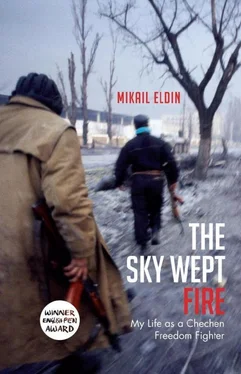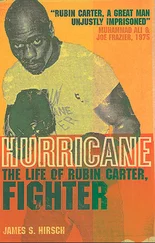During my first few days in Urus-Martan, my insomnia returned with a vengeance. This time it was the silence that I was finding oppressive. My relatives had a house on the main road, where the traffic was fairly heavy for wartime. At night the beams of passing cars would sweep across my window, just like the flash that comes before a blast, and after each flash I would instinctively wait for the explosion. I spent several nights in horrible tension, until my nerves ceased sending alarm signals to my brain. If each flash had been followed by a thunderous blast, my mind would have automatically determined which sector of the city was under fire and I would have fallen asleep without any trouble. Going crazy from the lack of sleep, I tortured my hosts with the question, ‘Why aren’t there any explosions after the flashes?’ Finally my brain stopped responding so violently to the headlight beams and I could fall asleep, though during the night I would often dream of the dead city.
After Grozny I could not get rid of the feeling that there was a chasm between those of us who had witnessed and participated in that hell and the people here, the civilian population, for whom life went on as usual. It was as if that war-torn city, overrun by two-legged and four-legged curs gone wild from the scent of blood, had never been. Here people were living, loving, marrying and divorcing, dying of natural causes and being buried with sumptuous funerals. Young, healthy guys were sitting about at home at the very time kids the same age in Grozny were fighting for their motherland’s freedom, knee-deep in their own and the enemy’s blood. While the corpses of thousands of young people at the dawn of their lives were being left unburied in my city – where there was nobody to bury them, and they were eaten by dogs in violation not just of religious law but of the moral laws of humanity – here in this town some doddering old man would be buried with the utmost solemnity, as if he were a pillar of the nation’s wellbeing. Of course, in my mind I understood that this was life, and that everyone had his own personal fate, separate from the fate of the nation and of humanity at large, and these people too were helping our warriors in their own way – by giving birth to the next generation. But as for my heart – it could not understand them, nor did it want to.
Living in this town and meeting the Provisional Council’s representatives and supporters only intensified my antipathy to their stance. It was chilling to see their joy at the fall of Grozny, which they expressed passionately at their meetings in Urus-Martan. After my long contact with its members, I began to look upon the Provisional Council as a gang of Satan’s servants. Whenever an opposition political activist or fighter would start extolling the mighty arsenal and bravery of the Russian soldiers, who had ‘smashed Dudayev’s men, and quite right too’, a terrible searing surge of fury and hate would well up in me, and it took a superhuman effort to keep myself from uttering a wild, primal scream and sinking my teeth into his throat till this bloodthirsty traitor choked on his own blood and fell silent. But man’s most powerful impulse, the impulse for survival, restrained this crazy desire. For in this town, where both ardent supporters of Chechen sovereignty and supporters of the Russian side had flocked, I was meant to be just a journalist who had fled the war, though in fact I had abandoned my neutrality on the first night of the attack on Grozny. Here the psychological pressure was so monstrous that Grozny’s hell now seemed like a picnic site. At least there you were free to respond to people’s actions, be they friends or enemies. Here all you could do was grit your teeth and keep quiet. Stay silent to safeguard the people who were sheltering you.
After a couple of months I finally managed to find some acquaintances who were travelling to the Shatoy district in the mountains, and I set off with them for southern Chechnya. By that time, the Russian troops had slowly but stubbornly pushed into the southern and eastern parts of Chechnya, and fighting was already underway in the villages of the foothills. When I arrived in Shatoy, where my relatives were living as refugees, I ran into quite a few fighters and special-forces soldiers of my acquaintance. They had their base in the town, along with the headquarters of Hamzat Gelayev, who’d just recovered from being heavily wounded in Grozny. Here too was the Office for the Prosecutor General of the Chechen Republic, headed by Usman Imayev. [19] Usman Imayev was the Prosecutor General for Chechnya. He was a field commander and engaged in combat against the Russian Army. He went missing in action in the spring of 1996.
A few days later I rode in Imayev’s car to Vedeno. [20] Vedeno is a district centre in eastern Chechnya.
After passing the village of Ulus-Kert, we drove for a long time along the bed of a small mountain river, the Vashtar, until finally coming out on to the road to Vedeno. As Vedeno was the seat of the Chechen resistance military headquarters, Chechnya’s key government bodies were located there too. Despite many agreeable moments, the trip to Vedeno left me with a bad feeling. Some men flashing their military secret service ID had begun to pay close attention to my presence there. Their professional interest in me came down to the questions, ‘Who are you? Where are you from? Why aren’t you at your workplace? What are you doing here?’ And so it went on. They grilled me with an admirable obstinacy, despite my equally obstinate and consistent replies. [21] It so happens that the very same clever question, ‘Why aren’t you at your place of work?’ was put to me in December 1994 at the height of the war by Abu Arsanukayev, head of Dudayev’s security service, thereby demonstrating his somewhat modest intellect. And all that stopped him from answering my sarcasm with a demonstration of his power, too, was the explicit intervention of the fighters with whom I’d just returned from the front line. Generally speaking, you’d seldom encounter men of intellect in the Soviet military. The generals, though – Dzhokhar Dudayev, Boris Gromov, Aleksandr Lebed, Aslan Maskhadov – were the exception. Nevertheless, it was Lebed who offered the most vivid portrait of Soviet Russia’s top brass: ‘A general who is not a thief is a contradiction in terms,’ he said in an interview.
What irked me was that these secret agents never once invited me to their office. They’d approach me in the street in pairs or threes and keep on asking the same old questions, and if I carried on walking, they’d walk by my side. Of course, I was disgruntled at their attention. After all, I’d grown used to the fact that, since Grozny, the vast majority of the fighters already knew me by sight. In the end I decided to bring it up with Zelimkhan Yandarbiyev [22] Zelimkhan Yandarbiyev was Vice President and later President of Chechnya. He was a poet. He was assassinated in 2004 in Qatar.
and Imayev, whom I’d known since before the war, and with their help I broke free from the beady eye of the independent state.
In Vedeno I met Shamil Basayev, who came across as rather pleased with himself, but, this weakness aside, he was a fine warrior and strategist, and especially congenial to journalists. His thinking on the future of the Chechen state showed no hint whatsoever of the Islamic radicalism which he would later be said to espouse and personify. Unfortunately I never got to watch his transformation into a ‘radical’, as I had no further dealings with him. After a few days working as a consultant to some Russian journalists, I quit Vedeno for good and returned to Shatoy. There I joined a special-forces unit which was about to set off for the villages of Bamut, Stary Achkhoy and Yandi (Orekhovo) [23] The residents of Bamut, Stary Achkhoy and Yandi deserted the villages, leaving behind all their belongings for the use of the resistance. The villages were defended until the end of the first war, in April 1996.
in western Chechnya, where the Russians were stepping up their offensive. The regiment’s commanding officer was Hamzat Gelayev, who some time ago had been appointed commander of the south-western front (the south-eastern front being commanded by Basayev), and he was sending the special-forces fighters into the fiercest zones. After a long and strenuous trek, we arrived at our position near the village of Yandi, which the militiamen were fighting desperately to defend.
Читать дальше












